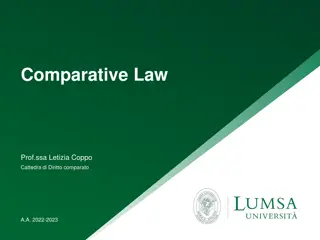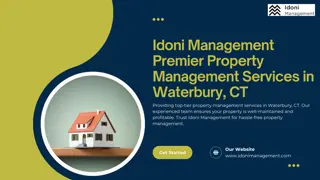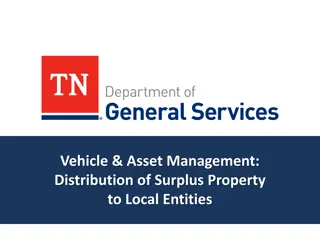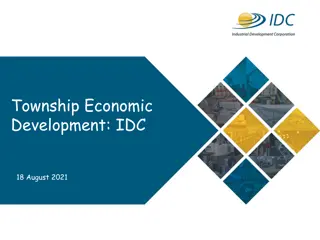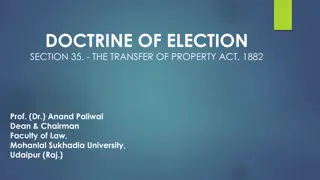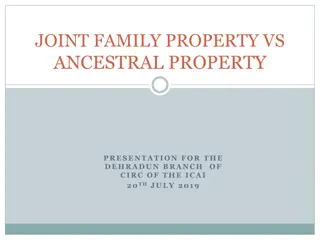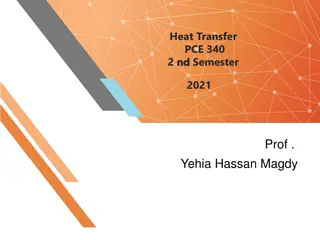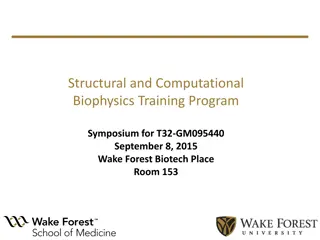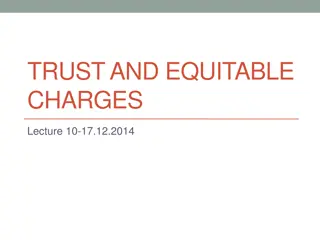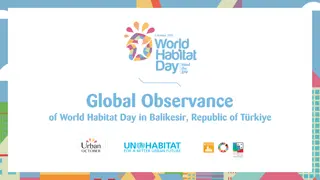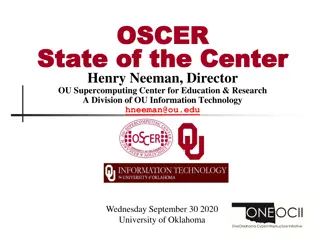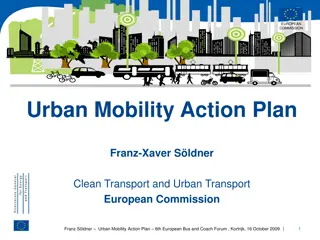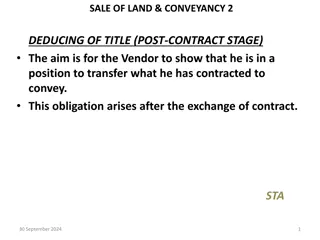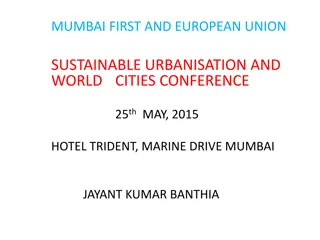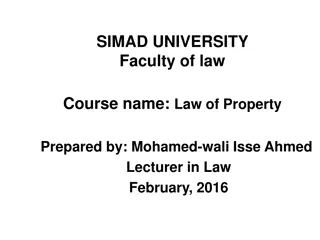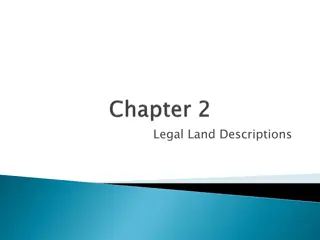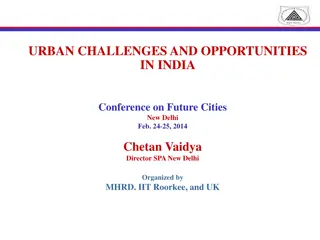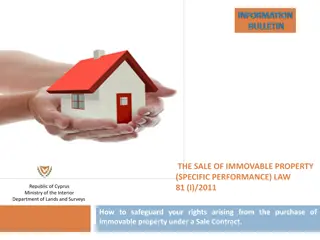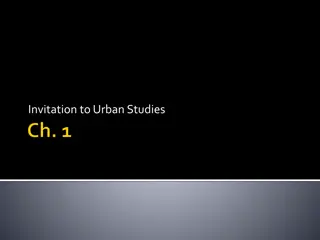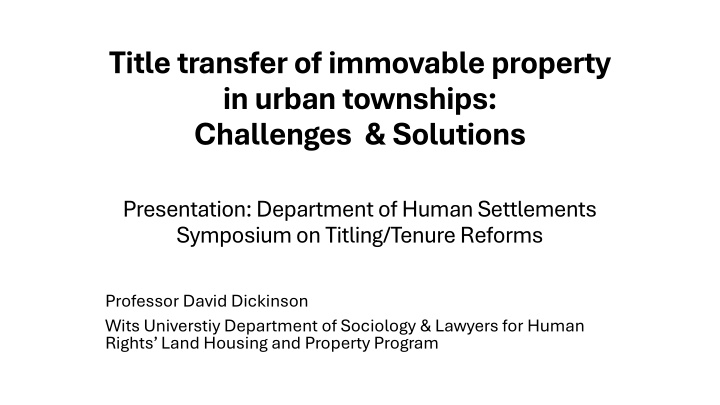
Challenges and Solutions in Urban Property Title Transfers
Explore the complexities in transferring property titles in urban townships, including challenges following the death of title holders and issues arising from non-transfer of title deeds. Learn about gender discrimination, family house disputes, and obstacles to legal ownership transfer. Discover how legal assistance and community support play crucial roles in resolving conflicts and promoting social cohesion.
Download Presentation

Please find below an Image/Link to download the presentation.
The content on the website is provided AS IS for your information and personal use only. It may not be sold, licensed, or shared on other websites without obtaining consent from the author. If you encounter any issues during the download, it is possible that the publisher has removed the file from their server.
You are allowed to download the files provided on this website for personal or commercial use, subject to the condition that they are used lawfully. All files are the property of their respective owners.
The content on the website is provided AS IS for your information and personal use only. It may not be sold, licensed, or shared on other websites without obtaining consent from the author.
E N D
Presentation Transcript
Title transfer of immovable property in urban townships: Challenges & Solutions Presentation: Department of Human Settlements Symposium on Titling/Tenure Reforms Professor David Dickinson Wits Universtiy Department of Sociology & Lawyers for Human Rights Land Housing and Property Program
Focus of the presentation Challenges to the transfer of title deeds following the death of the title holder beneficiary(ies) of a property under: The Conversion Act 1998 Upgrading of Tenure Rights Act 1991 (ULTRA) RDP housing (increasingly) The challenges that result from the non-transfer of title deeds. This does not address issues of housing delivery or informal settlements. These issues form part of Lawyers for Human Rights Land Housing and Property Program current research and advocacy focus on urban township property. It draws on our experience of clients seeking assistance at our pro bono law clinics, especially our partnership with the Orange Farm Human Rights Advice Centre. It builds on the work of others including Erica Edmond, Maxim Bolt, the Social and Economic Research Institute.
However, these challenges nest within a wider matrix of problems regarding property in urban townships Excluding the core issues addressed in this presentation these include: Excluding the core issues addressed in this presentation these include: Initial (free) transfer of title Initial (free) transfer of title that bestows property that must now/eventually be further transferred via bureaucratic and expensive processes. The original transfers were based on males holding the apartheid-era permits (especially with ULTRA) leading to gender discrimination The family house family house (a social reality, but without legal status) results in multiple disputes over ownership, rights of residence, rights to income flows, and ancestral significance. This is a major cause of family/community conflict and a low trust environment. Successive generations increase the number of owners of a family house leading to fractional social ownership The same fractional legal ownership fractional legal ownership is created when title deed holders die intestate Testate transfer Testate transfer may conflict with social norms and expectations over family houses. Many properties are sold without transfer of title sold without transfer of title. This can occur in a range of contexts (over the heads of other family members, organised sale of land to which the seller has no title, multiple consecutive sales, etc.). Occupation of property can be sanctioned at street level authority street level authority (e.g. councillors). Many households are in municipal rates arrears municipal rates arrears. Knowledge Knowledge and access to process of transfer are limited. Disputes over housing are often bitter. By the time they reach advice offices/law clinics, resolution by negotiation is difficult is adversarial is adversarial which further erodes social cohesion erodes social cohesion. Many private lawyers take advantage of clients private lawyers take advantage of clients, often failing, as required by the Legal Practice Act, to provide up front cost estimates. Parties to disputes forum shop forum shop further complicating matters. In townships, there are multiple sources of power multiple sources of power (not just law) that are mobilised when dispute occur: families, neighbours, block committee, CPFs, nkabis, and other forms of intimidation, harassment orders, evictions etc. gender discrimination. fractional social ownership. intestate (which is common). negotiation is difficult. The legal system legal system
Many/most of these challenges have an key important underling casual and/or exacerbating factor South Africa s extreme inequality means that: Despite the relatively privileged position of urban township residence who are the beneficiaries of a property; Many families do not have the resources available to manage this property. Alternatively, the management of the property is compromised by multiple and competing demands.
The Challenge of Title Transfer (on death of a beneficiary holder) in Brief Death of the title deed holder(s) Dies testate > potential conflict between freedom of testation and family house norms/customs Dies intestate > fragmentation of legal ownership Deceased Estate Administration Estate < R250,000: Letter of Authority Potential family conflict as limited oversite Estate > R250,000: Letter of Executorship Requires use of a lawyer (or similar) and costs Conveyancing Cost of conveyancing Potential cost of rates clearance Problems arising when cost and complexity of transfer of title leave the ownership unchanged ghost houses
Two routes for deceased estate management For many township title deed holders, the house is by far the most significant asset in their estate. The executor of a deceased estate requires either a Letter of Authority transfer the deceased s assets (in terms of a will or intestate law). A Letter of Authority can be issued at a magistrate s court. This allows the holder to distribute the deceased estate without oversight. Those with a Letter of Executorship are required by the Master s Office to appoint an attorney or other professional to (co)administer the estate. Which letter is required depends on the value of the estate as provided for in Section 18(3) of the Administration of Estates Act. Since 2014, this has been set R250,000 (Determined by the Minister of Justice and Correctional Services). The Master s Office uses the ratable value (i.e. the municipal rates bill) to determine the value of property. Letter of Authority or Letter of Executorship Letter of Executorship to
Costs of deceased estate management and transfer of property If the house s rateable value is over R250,000. The professional executor is entitled to 3.5 percent of the value of the estate, plus VAT. To this must be added a range of expenses, such as advertising. The cost of administrating an estate of R250,000 is in the region of R13,000, yet the family house is often the only asset of significant value in the estate from which this must be paid. If the value of the estate is below R250,000 a letter of authority is issued, costs are minimal. Transferring the title deed into another family member s name must be done by a conveyancer. For a house valued at R250,000 this will be around R15,000. Finalising the estate comprising of a house with a rateable value of R250,000 comes to not much less than R30,000. If, as is common, the estate comprises of not much more than a house, typically the home of several family members, then selling it to allow pay for executorship and/or transfer would be absurd.
How often are township properties valued over R250,000? Analysis of the rateable value of properties in Orange Farm township (which falls under the City of Johannesburg Metropolitan Municipality) shows: There are just under 16,000 residential houses in Orange Farm. 42.5 percent (6,764 houses) have ratable values above R250,000. If the threshold for requiring a Letter of Executorship was raised to R420,000 (see below) the number of residential properties with a rateable values requiring a Letter of Executorship would fall to just 536 houses or 3.4 percent of the total Illustrating the compressed nature of township property values. In 1994, the Section 18(3) threshold was set at R50,000 and its present value lags CPI by just under R30,000. But CPI isn t the appropriate index when the deceased estate consists of a house. Between 1994 and 2024 house prices increased at approximately twice CPI. On this basis, the Section 18(3) threshold would now be around R420,000.
What are the implications of these costs of estate management and property transfer? Where the property is valued at over R250,000 families have to find significant sums of money for the estate executor. Irrespective of the value of the property, families must find considerable amounts of money to have property transferred from the name of the deceased to another person. (This is the case for any transfer and not just following the death of the title owner). If this cannot be afforded (which is often the case) the title deed remains in the name of the deceased. Unpaid rates bills will add to the total costs of transfer. This results in ghost houses, properties registered in the name of deceased people.
(Some of) The Implications of Ghost Houses For families it means living without their affairs in order and the insecurity that results. In South Africa, getting family affairs in order after the death of a loved one is a privilege of the privileged. The complexity of any dispute over the house increases as successive generations live in a house for which there is no living title holder. Ghost properties mean that the Deed s Office registry is inaccurate (cadastral voids) with negative implications for property and rates management. The problem also seeps into other aspects of regulation: E.g. the current drive to register spaza shops for which applicant must prove ownership of the property, or permission from the owner, not easy when the legal owner is deceased.
Solutions The problems raised here are embedded in the wider context of inequality and the linked matrix of problems in township housing. However, I focus on the two aspects focused on in the presenation: deceased estate management & conveyancing (transfer of title). The R250,000 threshold between Letter of Authority and Letter of Executorship The R250,000 threshold between Letter of Authority and Letter of Executorship. This is set by a Ministerial Determination. This could be rapidly raised. As suggested, this should take into account property inflation, rather than CPI. Drawbacks? There is no oversight with a Letter of Authority which can lead to abuse. This raises the need for: Awareness and education Support for township-based advice centres The cost of conveyancing is more difficult to address. The cost of conveyancing is more difficult to address. Digitalising of the deeds system may help to reduce costs. Pro-bono legal assistance would also assist but there is a large need and the pro-bono system is chaotic with only limited resources available in practice. We need to re-think how property is transferred in ways which parallel key advantages of a title deed, but are not so legalistic, bureaucratic, or costly. This does not need to be a one-size-fits-all approach. Any such reform is likely to be resisted by conveyancers. It is also likely to be unpopular with state bodies as it potentially reduced statistical and regulatory control of property ownership however this has to be balanced against the current system in which ghost houses are increasingly degrading the accuracy and coverage of the current system.


